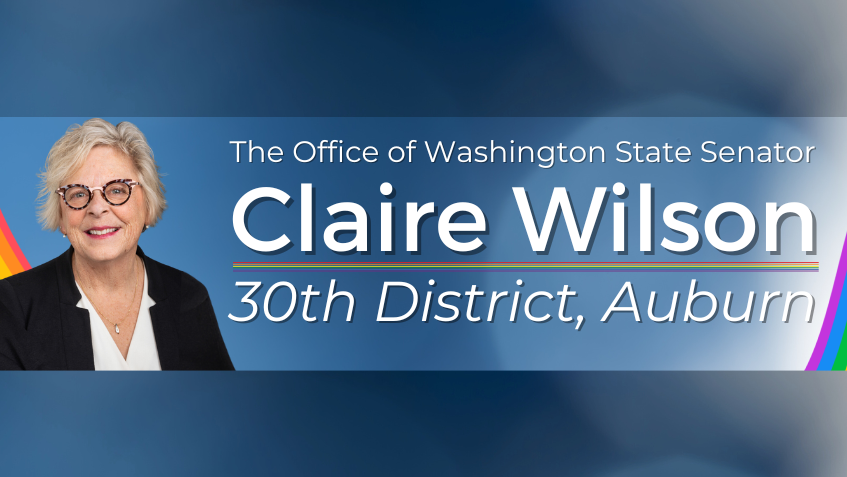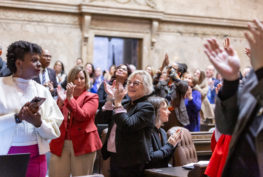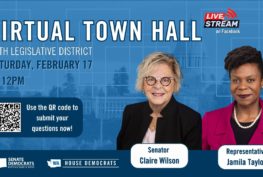Dear neighbors,
Fun fact: did you know that 95.8% of bills passed during the 2024 legislative session did so with bipartisan support, many passed unanimously? Also did you know there are more than 7,500 apple varieties?
As a brief recap, throughout the short session we passed meaningful housing funding, advanced healthcare, promoted economic growth, jobs, and prioritized student safety in our schools, public safety on our streets, fighting the opioid epidemic, and much more.
And though some of the lights are off at the capital during the summer, we are still hard at work planning for the upcoming 2025 legislative session. For me, this means meeting with community members, advocates, organizations representing diverse individuals and groups both locally and statewide putting in motion bills that will help affect meaningful change in our communities. That’s what this end of summer newsletter is about!
Take a look at some of what we’re up to in the office of the 30th District Senator 🙂
Unaccompanied Minors: and programs that help house & train youth
Not sure if you saw but I released a short video on my Instagram in July where I detailed this trip. Check it out by clicking the picture link below if you can, and give me a follow to stay plugged in!
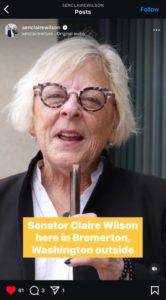 As the chair of the Human Services committee, I have the privilege of hosting two committee meetings and tours in a city/region of choice. We try to branch out to learn from and listen to all corners of the state. For our first meeting this interim we chose the Kitsap Peninsula starting in Bremerton and making our way north up to Port Townsend and then onto Clallam Bay.
As the chair of the Human Services committee, I have the privilege of hosting two committee meetings and tours in a city/region of choice. We try to branch out to learn from and listen to all corners of the state. For our first meeting this interim we chose the Kitsap Peninsula starting in Bremerton and making our way north up to Port Townsend and then onto Clallam Bay.
We learned directly from community members and stakeholders at an open-to-the-public meeting at the Bremerton City Hall, day one. Then on day two we headed up to Port Townshend and visited the Proctor House (a place where they help care for young people exiting state facilities, or in need of a safe + supportive place to be) and saw the programs run by Owl 360- The Nest (a coffee shop for young people to gather, share community and gain valuable working skills) and The Parliament/Pfeiffer Houses (a place where young people can get affordable housing, helping them learn to live in apartments for up to 2 years while working and in many cases working on school credits). We got to see firsthand some of the work being done to house and train our youth—many of which have transitioned out of Rehabilitation facilities.
These facilities are two great examples of the options we may look to when aiming to house our unaccompanied minors exiting the ‘system.’ And by unaccompanied we are simply meaning young people coming out of our child welfare system who may not have a significant adult in the outside world to care for them.
On day two we visited Clallam Bay Corrections Center. Here we had the opportunity to learn more about the various programs offered at CBCC, including beekeeping, cat-fostering, baking, and the opportunities for education. I often describe that in my role, I handle the “culture and climate” of the Department of Corrections, and prisons. Having the opportunity to visit prisons across the state helps me better understand the complex needs of both staff and the people who are incarcerated- what’s working and where we can improve. For me public safety is everything, and one way we can promote public safety is to ensure our prisons are rehabilitative, and that people who are incarcerated are provided the tools and opportunities to grow.
Our next trip takes us to Eastern Washington, where we will visit Spokane and surrounding areas.
Heavy-hitting travels; bringing tools from across the nation back home to WA
For me, it’s all about the information you come back with, and what you actually do with it.
National Conference of State Legislatures (NCSL), Washington DC
This June in DC I gathered with other Health and Human Services Chairs from across the country and participated in many solution-focused tables. Every state, in one way or another, is facing similar issues to Washington—these trips have been a drawing table to meet with other states a learn more about what we can do to service our communities.
Council of State Governments (CSG), Kentucky
Every year I stay busy learning from others and in some cases that takes my work across the nation. One of the trips I am SUPER excited to announce is my induction into the Council of State Government’s (CSG) 2024 Henry Toll Fellowship! For those who may not know, this is a group of “49 outstanding state leaders selected to join national leadership development program for government officials.” The Henry Toll Fellowship is an intense leadership boot camp and not a traditional professional development or policy program. This experience challenges participants to move out of their comfort zones and take an introspective look at how they view themselves as leaders. Participants will engage in active, rigorous activity – both physically and mentally.
The fentanyl and opioid crisis
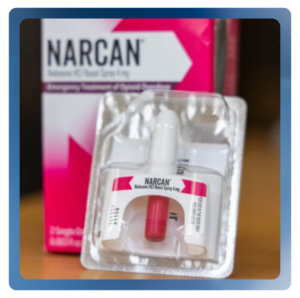 Our nation is facing a crisis, and we have a duty in this state to do all that we can to protect families and to protect our children. Legislatively, this is one of my prime directives—as a matter of fact I just had a meeting days ago with the national group, Community Anti-Drug Coalitions of America (CADCA) to shoot a video on the legislation we recently passed around the availability of Naloxone in schools and higher ed institutions to share with families locally and across the nation. I’ll share it when they do.
Our nation is facing a crisis, and we have a duty in this state to do all that we can to protect families and to protect our children. Legislatively, this is one of my prime directives—as a matter of fact I just had a meeting days ago with the national group, Community Anti-Drug Coalitions of America (CADCA) to shoot a video on the legislation we recently passed around the availability of Naloxone in schools and higher ed institutions to share with families locally and across the nation. I’ll share it when they do.
Here’s a couple of legislative actions we took this year to fight back against the opioid crisis and help loosen the grip it has on our communities:
SB 6109, a bill that I personally ushered through the Senate and the House and on to the Governors desk for signature provides clearer guidance on the lethality of high potency synthetic opioids for those involved in the court and child welfare system in a home where child removal is being considered. By clarifying existing laws, we can keep children safe from high potency synthetic opioids while strengthening and maintaining unification within the family unity. (SB 6109)
SB 5804, which passed unanimously out of the Senate, requires all school districts, charter schools, and state-tribal education compact schools to stock opioid overdose reversal medication in each school and to plan how to handle overdoses.
SB 5906 requires the Department of Health to develop and implement a drug overdose prevention and education campaign for youth and adults, including information on dangers and harms related to drug use.
HB 1956 provides updated substance use education resources for students and families in middle and high schools and revises K-12 learning standards to include information on fentanyl, opioids and other life-threatening drug use.
HB 2112 requires all higher education institutions to provide opioid and fentanyl prevention education, as well as life-saving opioid reversal medication and fentanyl strips and training to administer these life-saving tools to all students.
Through better access to education, treatment, prevention and facilities, we are working to turn the tide of the fentanyl crisis.
Signing off
Alright, back to work for me! In addition to the meaningful work mentioned above^ I stay busy in meetings with people from all corners of our community and across the state. I am community coalition building, listening, and learning ahead of the 2025 legislative grind!
As always, I invite you to contact my office anytime.
-Claire Wilson,
30th Legislative District Senator
